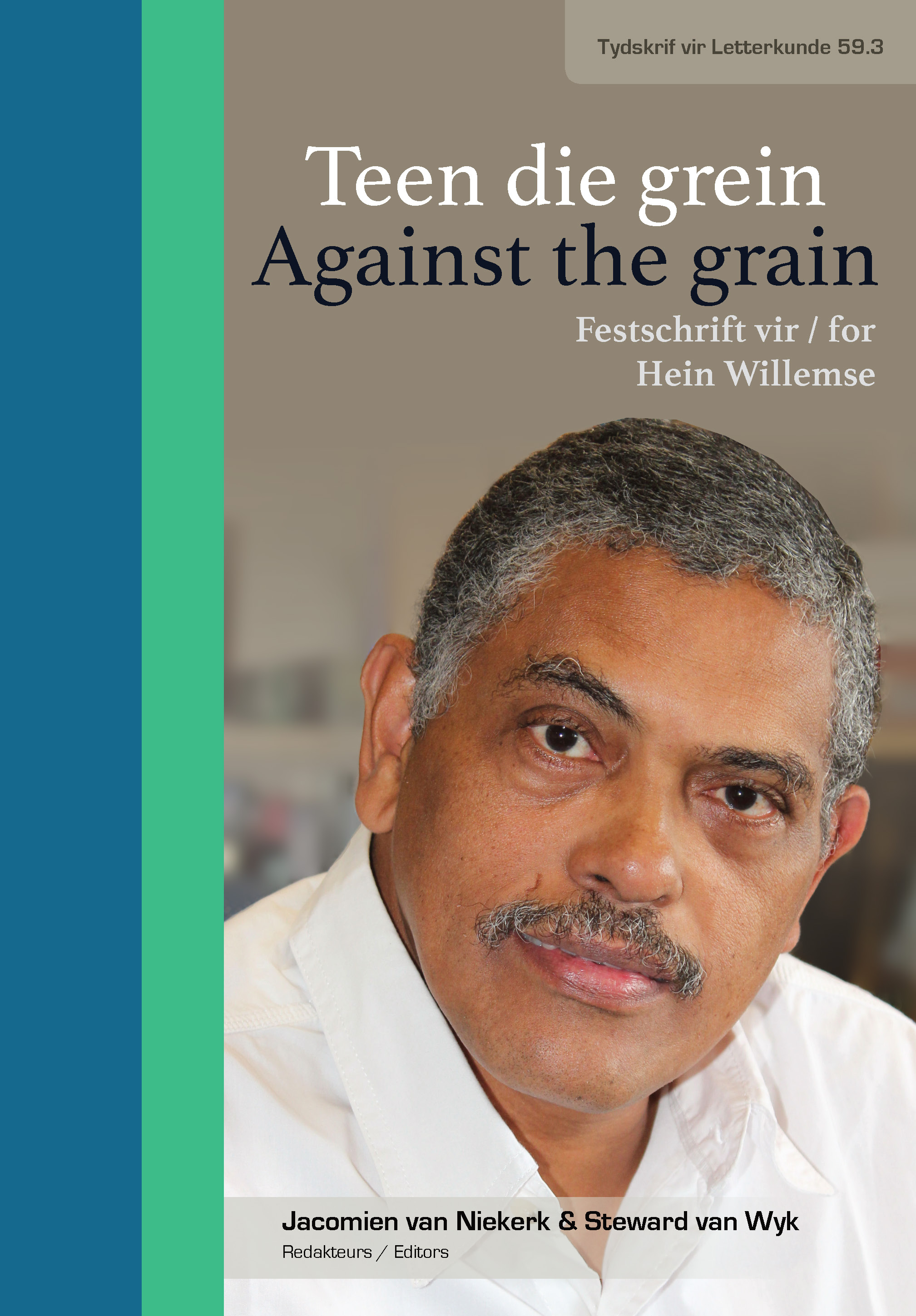To listen with decolonial ears: Hein Willemse, hidden histories, and the politics of disruptive intervention
DOI:
https://doi.org/10.17159/tl.v59i3.13123Keywords:
decolonial listening, “buitekanonisering”, postcoloniality, conscious oppositionalityAbstract
In this article, we canvass some of the ideas around Hein Willemse’s focus on hidden histories, conscious oppositionality, and literature that falls outside the canon, which began to coalesce following contemporary calls for decolonial approaches in the (South) African academy. While the decolonial turn has focused attention on shared histories within Global South contexts, it is through Willemse’s postcolonial teachings that we first came to understand the importance and meaning of reclaiming the lost African ontological space. This article is, therefore, located in postcolonial and decolonial scholarship in the sense that it is not driven by a particular method but rather by questions that emerged from larger social contexts. We draw on Willemse’s visionary understanding of the importance of hidden histories and what it might mean to listen with postcolonial and/or decolonial ears. This, amongst other things, requires an acute awareness of history, heritage, and legacies both in society and in the academy. We incorporate a random selection of his work to unpack how his disruptive intervention serves to reformulate the idea of Afrikaans and Afrikaans literature in ways that are more inclusive of those silenced by the apartheid project, including Africa and the Global South at large.
Downloads
References
Adichie, Chimamanda Ngozi. “The Danger of a Single Story.” TED. Jul. 2009. https://www.ted.com/talks/chimamanda_ngozi_adichie_the_danger_of_a_single_story?language=en.
Ashcroft, Bill & Pal Ahluwalia. Edward Said. Routledge, 2009.
Ashcroft, Bill, Gareth Griffiths & Helen Tiffin. The Empire Writes Back. Routledge, 2002.
Asante, Molefi Kete & George Yancy. “Molefi Kete Asante: Why Afrocentricity?” The New York Times. 7 May 2015. https://opinionator.blogs.nytimes.com/2015/05/07/molefi-kete-asante-why-afrocentricity/.
Bates, Jordan. “Literary canons exclude works no matter how selective canon makers are.” 25 Apr. 2013. The Daily Nebraskan. http://www.dailynebraskan.com/culture/literary-canons-exclude-works-no-matter-how-selective-canon-makers-are/article_da83def2-ad43-11e2-b07a-0019bb30f31a.html.
Benjamin, Walter. Illuminations, edited by Hannah Arendt & translated by Harry Zohn. Fontana, 1973.
Brink, André P. Reinventing a Continent: Writing and Politics, 1982–1995. Secker & Warburg, 1996.
Clarke, John. “Stuart Hall and the theory and practice of articulation.” Discourse: Studies in the Cultural Politics of Education vol. 36, no. 2, 2015, pp. 275–86. DOI: http://dx.doi.org/10.1080/01596306.2015.1013247.
De la Tierra, Tatiana. “Aliens and others in search of the tribe in academe.” This bridge we call home: radical visions for transformation, edited by Gloria Anzaldua & AnaLouise Keating. Routledge, 2002, pp, 358–68.
Grosfoguel, Ramon. “The epistemic decolonial turn: Beyond political-economy paradigms.” Cultural Studies vol. 21, no. 2–3, 2007, pp. 211–23. DOI: https://doi.org/10.1080/09502380601162514.
hooks, bell. Yearning: Race, Gender and Cultural Politics. Between the Lines, 1990.
Jantjies. Jodi. “Why Suidooster is Important in My Colouredness Journey.” VannieKaap. 5 Oct. 2020. https://news.vanniekaap.com/opinion/why-suidooster-is-important-in-my-colouredness-journey/.
Mignolo, Walter. “Epistemic disobedience, independent thought and decolonial freedom.” Theory, Culture and Society vol. 26, no. 7–8, 2009, pp. 1–23. DOI: https://doi.org/10.1177/0263276409349275.
Nyamnjoh, Francis. “Decolonizing the University in Africa.” The Oxford Research Encyclopedia. Oxford U P, 2019. 1–36. oxfordre.com/politics.
Nyamnjoh, Francis. “Incompleteness: Frontier Africa and the Currency of Conviviality.” Journal of Asian and African Studies vol. 52, no, 3, 2017, 253–70. DOI: https://doi.org/10.1177/0021909615580867.
Opara, Ijeoma Nnodim. “It’s Time to Decolonize the Decolonization Movement.” 29 Jul. 2021. PLOS BLOGS: Speaking of Medicine and Health. https://speakingofmedicine.plos.org/2021/07/29/its-time-to-decolonize-the-decolonization-movement/.
Roy, Arundati. “Peace & The New Corporate Liberation Theology.” 2004 City of Sydney Peace Prize Lecture. CPACS Occasional Paper no. 04/2. Centre for Peace and Conflict Studies, U Sydney, 2004.
Said, Edward. Humanism and Democratic Criticism. Columbia U P, 2004.
Slack, Jennifer Daryl. “The theory and method of articulation in cultural studies.” Stuart Hall: Critical Dialogues in Cultural Studies, edited by Kuan-Hsing Chen & David Morley. Routledge, 2006, pp. 113–29.
Spivak, Gayatri Chakravorty. “Can the subaltern speak?” Marxism and the interpretation of culture, edited by Cary Nelson & Lawrence Grossberg. U of Illinois P, 1988, pp. 271–313.
Vázquez, Rolando. “Towards a Decolonial Critique of Modernity. Buen Vivir, Relationality and the Task of Listening.” Kapital, Armut, Entwicklung. Capital, Poverty, Development. Capital, Pobreza, Desarrollo. Dokumentation des XV. Internationalen Seminars des Dialogprogramms Nord-Süd, edited by Raúl Fornet-
Betancourt. Wissenschaftsverlag Mainz, 2012, pp. 241–52.
Willemse, Hein. “Aantekening by drie klein geskiedenisse.” Tydskrif vir Letterkunde vol. 47, no. 2, 2010, pp. 150–65. DOI: https://doi.org/10.17159/tl.v47i2.3093.
Willemse, Hein. Aan die ander kant: Swart Afrikaanse skrywers in die Afrikaanse letterkunde. Protea, 2007.
Willemse, Hein. “André P. Brink se bevrydende woord en dissidensie.” Tydskrif vir Letterkunde vol. 52, no. 2, 2015, pp. 210–4. DOI: http://dx.doi.org/10.4314/tvl.v52i2.16.
Willemse, Hein. “The hidden histories of Afrikaans.” Whiteness Afrikaans Afrikaners: Addressing Post-Apartheid Legacies, Privileges and Burdens. Mapungubwe Institute for Strategic Reflection (MISTRA), 2018. DOI: https://doi.org/10.2307/j.ctvh8qwz9.
Willemse, Hein. “’n Inleiding tot buitekanonieke Afrikaanse kulturele praktyke.” Perspektief en Profiel: ’n Afrikaanse literatuurgeskiedenis Deel 1, edited by Hennie P. van Coller. 2 nd edition. Van Schaik, 2016, pp. 73–91.
Willemse, Hein. “Jakes Gerwel (1946–2012).” Tydskrif vir Letterkunde vol. 50, no. 1, 2013, pp. 126–30. DOI: https://doi.org/10.4314/tvl.v50i1.10.
Willemse, Hein. “Om ruim in Afrika te leef.” Tydskrif vir Letterkunde vol. 40, no.1, 2003, pp. 8–22. DOI: https://doi.org/10.4314/tvl.v40i1.53612.
Willemse, Hein. “Outobiografie en herinnering as verset in Adam Small se The Orange Earth.” Tydskrif vir Letterkunde vol. 49, no. 1, 2012, pp. 70–81. DOI: https://doi.org/10.4314/tvl.v49i1.6.
Willemse, Hein. “Tokkelossie, ‘’n Boesman, outa Hendrik’ en ontkennende close readings.” Literator vol. 29, no. 3, 2008, pp. 57–73. DOI: https://doi.org/10.4102/lit.v29i3.125.
Willemse, Hein. “Towards the fullness of the Afrikaans language.” LitNet. 28 Aug. 2019. https://www.litnet.co.za/towards-the-fullness-of-the-afrikaans-language/.
Wright, Colin. “Centrifugal logics: Eagleton and Spivak on the Place of ‘Place’ in Postcolonial Theory.” Culture, Theory and Critique vol. 43, no. 1, 2002, pp. 67–82. DOI: https://doi.org/10.1080/14735780210143527.
Published
Issue
Section
License
Copyright (c) 2022 Tydskrif vir Letterkunde

This work is licensed under a Creative Commons Attribution-ShareAlike 4.0 International License.


 https://orcid.org/0000-0001-6465-6584
https://orcid.org/0000-0001-6465-6584


.png)